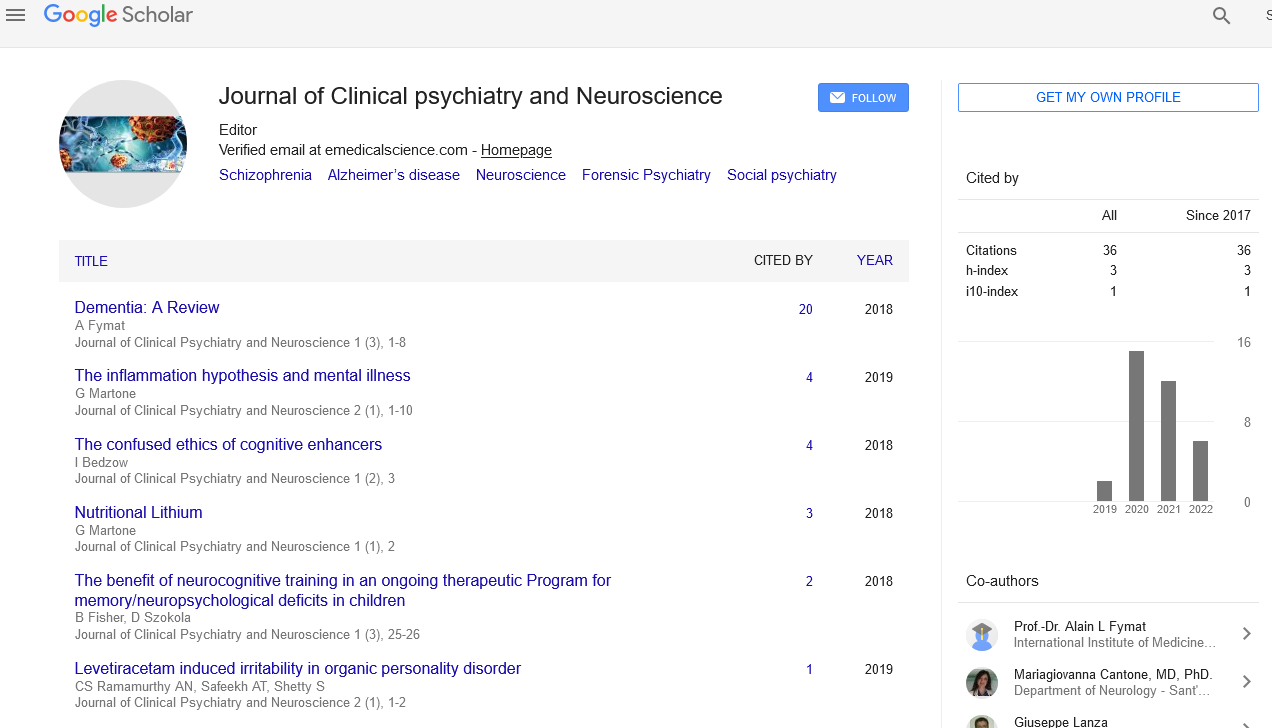Duality accounts of time and double orientation to reality in depressive psychosis
Received: 07-May-2023, Manuscript No. puljcpn-23-6586; Editor assigned: 09-May-2023, Pre QC No. puljcpn-23-6586 (PQ); Accepted Date: May 26, 2023; Reviewed: 10-May-2023 QC No. puljcpn-23-6586 (Q); Revised: 11-May-2023, Manuscript No. puljcpn-23-6586 (R); Published: 27-May-2023, DOI: 10.37532/puljcpn.2023.6(3).106-07
Citation: James O. Duality accounts of time and double orientation to reality in depressive psychosis J Clin Psychiatry Neurosci. 2023; 6(3):106- 07.
This open-access article is distributed under the terms of the Creative Commons Attribution Non-Commercial License (CC BY-NC) (http://creativecommons.org/licenses/by-nc/4.0/), which permits reuse, distribution and reproduction of the article, provided that the original work is properly cited and the reuse is restricted to noncommercial purposes. For commercial reuse, contact reprints@pulsus.com
Abstract
This essay contends that Henri Bergson's, Edmund Husserl's, and John McTaggart's examples of duality accounts of time reflect the division of temporal experience in depressive psychosis into objective and subjective aspects of time. The research also suggests using the concept of a dual orientation to reality that is typical of schizophrenic delusions to understand the full-fledged depressed temporal illusion, in which the subjective flow of time comes to a standstill. A person who has a depressed temporal illusion asserts that time is not passing while concurrently maintaining a mostly unaffected cognitive orientation to time, leading to the dual orientation. The depressive hallucination about the passage of time can be located by contrasting temporal experience in depression with temporal disorientation in dementia.
Key Words
Dementia; Major Depressive Disorder
Introduction
This essay contends that Henri Bergson's, Edmund Husserl's, and John McTaggart's examples of duality accounts of time reflect the division of temporal experience in depressive psychosis into objective and subjective aspects of time. The idea of dual time accounts refers to philosophical theories of time that start by separating two dimensions or two different ways to describe the temporal reality. The breakdown of temporal experience in philosophical reflection is not pathological and is done on purpose to gain understanding of the nature of time. Though its unintended melancholy form could suggest a disconnection from reality. By putting the problem of temporal experience front and centre, it is possible to accurately understand the root of such an estrangement in depressive disorder.
The introduction of the paper provides a brief overview of three schools of philosophical thought on time that Bergson, Husserl, and McTaggart started. It ends by demonstrating how structurally similar these reflections are to the depressive deformation of temporal perception. The temporal experience of depression is provided in accordance with both historical and modern psychopathological literature. The presentation's main topic is the temporal illusion, which is the phrase used to describe the psychotic experience of the subjective flow of time coming to a complete stop. The paper also analyses the phenomenological foundations of orientation and disorientation in time for the purpose of supporting the argument. A normal orientation to time is said to involve conscious cognitive dialectics of tensed and untensed temporalities and to involve a constant synchronization of the lived present with universal time.
According to both first-person reports and time estimation tasks, sad people feel time as being longer on a quantitative level. Having ‘more' time available is far from being pleasant when it comes to qualitative changes, and in fact, bad emotions in general, like boredom, might be linked to time dragging. Being bored is related to having little information to digest. An allocation of increased attentional resources to time occurs in a static informational environment (analogous to sensory deprivation) that has few contextual alterations. As a result, one experiences longer durations (i.e. slowness) in prospective judgement and shorter durations (i.e. acceleration) in retrospect converting the structural adjustments suggested by this quantitative model.
People who are depressed see time as being longer on a quantitative level, according to both first-person accounts and time estimate exercises. When it comes to qualitative changes, having "more" time available is far from pleasant, and in fact, negative emotions in general, like boredom, may be connected to time dragging. Having little information to process is related to being bored. When there are limited contextual changes and a static informational environment (similar to sensory deprivation), more attentional resources are allocated to time. The structural modifications indicated by this quantitative model are converted into longer durations (i.e. slowness) in prospective judgement and shorter durations (i.e. acceleration) in retrospect.
The impression of the standstill of time, a severe manifestation of the anomalous experience of time in depression, largely affects the tripartite order of the subjective flow of time. The orientation to world time, as shown by studies on time perception, qualitative research, and patient behavior, simultaneously remains largely unaltered. As a result, the sense of timelessness is never complete and is never fully acted upon, which forms the basis of the twofold orientation that characterizes (at least some) schizophrenia delusions. The temporal double orientation in depressive psychosis does not exactly resemble its schizophrenic double-bookkeeping counterpart because of the fundamental nature of temporal experience, which, phenomenological speaking, preconditions all delusional and nondelusional object-related beliefs and perceptions. However, similar to a schizophrenia, the temporal illusion is (to some extent) behaviorally inert.





